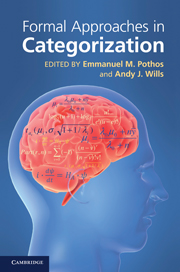Book contents
- Frontmatter
- Contents
- List of figures
- List of tables
- List of contributors
- 1 Introduction
- 2 The generalized context model: an exemplar model of classification
- 3 Prototype models of categorization: basic formulation, predictions, and limitations
- 4 COVIS
- 5 Semantics without categorization
- 6 Models of attentional learning
- 7 An elemental model of associative learning and memory
- 8 Nonparametric Bayesian models of categorization
- 9 The simplicity model of unsupervised categorization
- 10 Adaptive clustering models of categorization
- 11 Cobweb Models of Categorization and Probabilistic Concept Formation
- 12 The knowledge and resonance (KRES) model of category learning
- 13 The contribution (and drawbacks) of models to the study of concepts
- 14 Formal models of categorization: insights from cognitive neuroscience
- 15 Comments on models and categorization theories: the razor's edge
- Index
- References
1 - Introduction
Published online by Cambridge University Press: 05 June 2012
- Frontmatter
- Contents
- List of figures
- List of tables
- List of contributors
- 1 Introduction
- 2 The generalized context model: an exemplar model of classification
- 3 Prototype models of categorization: basic formulation, predictions, and limitations
- 4 COVIS
- 5 Semantics without categorization
- 6 Models of attentional learning
- 7 An elemental model of associative learning and memory
- 8 Nonparametric Bayesian models of categorization
- 9 The simplicity model of unsupervised categorization
- 10 Adaptive clustering models of categorization
- 11 Cobweb Models of Categorization and Probabilistic Concept Formation
- 12 The knowledge and resonance (KRES) model of category learning
- 13 The contribution (and drawbacks) of models to the study of concepts
- 14 Formal models of categorization: insights from cognitive neuroscience
- 15 Comments on models and categorization theories: the razor's edge
- Index
- References
Summary
Categorization is one of the most fascinating aspects of human cognition. It refers to the process of organizing sensory experience into groups. This is an ability we share to some extent with other animals (e.g. Herrnstein & Loveland, 1964), and is key to our understanding of the world. Humans seem particularly adept at the systematic and productive combination of elementary concepts to develop complex thought. All in all, it is hard to envisage much of cognition without concepts.
The study of categorization has a long history (e.g. Hull, 1920). It is usually considered a particular research theme of cognitive psychology, cognitive science, and cognitive neuroscience. Categorization relates intimately to many other cognitive processes, such as learning, language acquisition and production, decision making, and inductive reasoning. What all these processes have in common is that they are inductive. That is, the cognitive system is asked to process some experience and subsequently extrapolate to novel experience.
A formal model of categorization is taken to correspond to any description of categorization processes in a principled, lawful way. Formal models of categorization are theories that allow quantitative predictions regarding the categorization behaviour of participants. Some formal models also make predictions about the underlying neuroscience.
Selecting the models to be discussed in this volume was difficult. Our goal was to create an accessible volume with a reasonably small number of models. As a result, there are many excellent models which we were not able to include.
Information
- Type
- Chapter
- Information
- Formal Approaches in Categorization , pp. 1 - 17Publisher: Cambridge University PressPrint publication year: 2011
References
Accessibility standard: Unknown
Why this information is here
This section outlines the accessibility features of this content - including support for screen readers, full keyboard navigation and high-contrast display options. This may not be relevant for you.Accessibility Information
- 6
- Cited by
